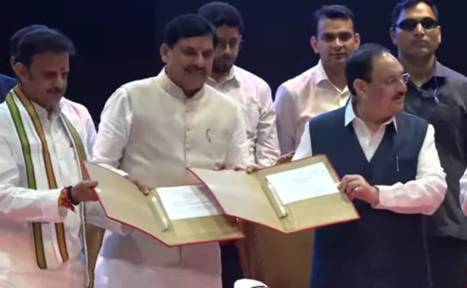JP Nadda Inaugurates Medical Colleges, Launches Health Initiatives in MP
In addition, agreements were signed to establish four new medical colleges under the Public–Private Partnership (PPP) mode, supported by the Union Health Ministry.

- Country:
- India
Union Minister of Health and Family Welfare Shri Jagat Prakash Nadda inaugurated two new Government Medical Colleges in Sheopur and Singrauli, alongside several landmark health initiatives aimed at strengthening public health, medical education, and community outreach in Madhya Pradesh.
The event was attended by Dr Mohan Yadav, Chief Minister of Madhya Pradesh, Shri Rajendra Shukla, Deputy Chief Minister in charge of Public Health and Medical Education, and Shri Hemant Khandelwal, MLA, Betul, among other senior dignitaries.
Strengthening Medical Education in Underserved Regions
The establishment of the new medical colleges in Sheopur and Singrauli is expected to significantly expand opportunities for medical education and healthcare delivery in tribal and underserved regions of Madhya Pradesh. The colleges will not only address the shortage of trained doctors but also enhance access to quality healthcare for local communities.
In addition, agreements were signed to establish four new medical colleges under the Public–Private Partnership (PPP) mode, supported by the Union Health Ministry. This aligns with the government’s national vision to make medical education more accessible, affordable, and geographically inclusive.
Launch of Health and Community Initiatives
Alongside the inaugurations, several health programmes were launched:
-
Distribution of 8 lakh Vay Vandana PVC Cards to facilitate easier access to health services for senior citizens.
-
Launch of ‘Ayushman Sakhi’ Smart Chatbot, an interactive platform to provide real-time information on government health schemes.
-
Swasthya Yakrit Mission milestone, marking 1 crore liver health screenings achieved under the Healthy Liver initiative.
-
‘Asha Samvaad’ platform for direct engagement between ASHA workers and the Ministry, empowering grassroots health workers.
-
Maternal and Child Health initiatives, including new communication material on maternal nutrition and the introduction of a Mother and Child Protection (MCP) Card to strengthen monitoring of maternal and child health.
India’s Progress in Healthcare Delivery
Speaking at the occasion, Shri Nadda emphasized the government’s vision of building a holistic healthcare system, focusing not only on curative but also preventive, palliative, rehabilitative, geriatric, and promotional healthcare.
He noted:
-
Institutional deliveries have risen to 89%, reducing risks for mothers and newborns.
-
The Maternal Mortality Ratio (MMR) has dropped from 130 to 93 per 1 lakh live births.
-
The Under-5 Mortality Rate (U5MR) has fallen by 42%, compared to a global average decline of 14%.
-
Neonatal mortality has reduced by 39%, significantly higher than the global average decline of 11%.
Tackling Non-Communicable Diseases at Scale
Under the National Non-Communicable Diseases (NCD) Programme, India has conducted large-scale screening campaigns:
-
Hypertension: 39 crore screened, 5.2 crore diagnosed.
-
Diabetes: 39 crore screened, 3.5 crore diagnosed.
-
Oral Cancer: 33 crore screened, 1.52 crore diagnosed.
-
Cervical Cancer: 10.3 crore screened, 90,000 diagnosed.
-
Breast Cancer: 17 crore screened, 42 lakh diagnosed.
These unprecedented figures demonstrate the government’s commitment to early detection and intervention.
Ayushman Bharat – The World’s Largest Health Coverage Programme
The Minister highlighted that Ayushman Bharat now covers 50 crore beneficiaries, making it the largest universal health coverage scheme in the world. Complementary schemes such as Vay Vandana extend protection to citizens above 70 years of age, regardless of income status.
Expanding Medical Education and Infrastructure
Shri Nadda noted that India has nearly doubled its medical colleges in the last decade:
-
2014: 387 colleges
-
2025: 780 colleges
Similarly, undergraduate medical seats have tripled from 56,000 to 1.7 lakh, with a target of adding another 75,000 UG and PG seats in the next five years. Out-of-pocket expenditure on healthcare has also reduced sharply, from 62% to 39%, easing the financial burden on families.
He credited reforms like NEET in 13 languages for democratizing medical education and highlighted India’s scientific breakthroughs during the COVID-19 pandemic, including the development of two indigenous vaccines in just nine months and their global supply through the Vaccine Maitri initiative.
Madhya Pradesh’s Health Transformation
Chief Minister Dr Mohan Yadav recalled that before 2003, Madhya Pradesh had only five medical colleges. Today, the state boasts 17 government and 13 private colleges, including AIIMS Bhopal, and is on track to expand further.
He highlighted that land for medical colleges under the PPP model is being provided at a nominal cost of ₹1 per acre, underscoring the state’s proactive approach to expanding healthcare infrastructure.
The CM credited schemes like Ayushman Bharat PM-JAY, which provides ₹5 lakh coverage for vulnerable families, as transformative for the tribal and rural population.
A Decade of Health Gains and a Vision for the Future
The inauguration of medical colleges in Sheopur and Singrauli, along with the launch of health initiatives, marks a milestone in Madhya Pradesh’s health sector development. It reflects the Union Government’s broader vision under Prime Minister Modi’s leadership—to build a robust, inclusive, and preventive health system that ensures no citizen is left behind.
With an emphasis on medical education, maternal and child health, non-communicable diseases, and universal coverage, India is steadily moving towards the goal of a healthy, self-reliant, and developed nation by 2047.










